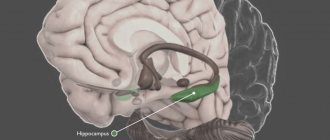Some people literally begin to panic when they have to visit the doctor's office. Even the thought of meeting with medical personnel instills horror and fear. Jatrophobia occurs in approximately 10% of the population. This condition can worsen significantly with age. The consequences often become very sad: endless stress leads to the formation of more and more new fears. At some point a person loses control of himself. Everything seems frightening, unknown and unpleasant to him.
Causes
We must understand that the fear of doctors does not arise out of nowhere. It appears as a result of traumatic events that create additional stress on the psyche. As a result, the nervous system cannot stand it and begins to fail. To fully understand the problem, you will need to analyze the current situation in detail.
Negligence of doctors
Fear is always the result of psychological trauma. If a person has experienced unfair treatment in a hospital, trust will disappear. The rudeness of medical staff often plays a fatal role in the formation of jatrophobia. The patient gets used to feeling like an insignificant person, to whom little attention is paid. Experiencing a state of fear and constantly worrying about your health can significantly weaken your nervous system. Then it becomes very difficult to convince yourself of the need to get tested or visit a specialist.
Suspiciousness
There are people who take everything too personally. They are constantly worried about any reason, afraid to express themselves. The percentage of jatrophobia they develop is very high. The fact is that people in white coats terrify those who are unsure of life and do not know what business to realize themselves in. This is a serious problem that must be addressed.
Long-term illness
A long-term illness deprives one of moral strength and provokes the formation of chronic fatigue. Its danger lies in the erosion of moral strength. As a result, a person stops believing in himself and his capabilities. Finding himself in front of a doctor, the individual is lost and does not know how to behave. It often happens that the disease starts, because a trip to a specialist is postponed indefinitely. A long-term illness that lasts several weeks or even months can significantly unsettle you. The individual loses too much vital energy and does not have time to replenish it.
Severe stress
Negative events affect the way we perceive reality. When there is too much stress, the nervous system is subjected to enormous stress. Sometimes people can’t stand it: they begin to resort to bad habits and make other attempts to calm down. The fear of going to the doctor often aggravates the current situation. Diseases become chronic, obsessive states appear. Severe stress is fraught with numerous negative consequences: the appearance of anxiety, the formation of panic attacks, and a lack of understanding of how to live further. Finding himself in such a situation, a person is rarely able to make responsible decisions and generally act adequately. It is no secret that nervous shocks unsettle you and contribute to the formation of additional tension.
Causes of phobia: fear of doctors
Fears do not appear just like that, without a reason; any fear arises from some factor, a situation that is negatively deposited in a person’s memory. This can be any medical procedure, each of which is associated with pain and discomfort. Many patients, at the mere word of surgery or the need for surgical intervention, begin to panic and find excuses to go to the hospital. They develop fear for their own lives and mistrust of the attending physician.
According to sociological surveys, 60% of the population of our country do not trust people who took the Hippocratic oath, and 15% go to private clinics, where the quality of service is slightly better than in ordinary public clinics. And the state of hospitals, clinics and other medical institutions leaves much to be desired. And if you add the boorish attitude, incorrect diagnoses, unqualified assistance, and sometimes complete indifference of the staff, it becomes clear that even a person with a healthy psyche will not have the desire to seek any help.
Suspiciousness and self-doubt, an inferiority complex plays an important role in the fact that some adults do not go to the dentist for years. As a result of this, they end up with a sad state of their oral cavity.
Women, and especially young girls, due to their inexperience and lack of knowledge, do not undergo an ordinary routine medical examination by a gynecologist. They are sure that if nothing bothers you, then visiting a female doctor is not advisable. This is a huge stupidity, since many dangerous diseases are asymptomatic and you will still need to go to the hospital later. It’s just that the disease will no longer be in its initial stages.
What if there is gangrene?
Any modern person knows that prevention is better than cure, that “twice a year is a must...”, however, most of us tend to delay a visit to a medical facility as long as possible. Even if you are not inclined to dramatize, suspecting you are having a heart attack as soon as you feel a pain in your chest, or seeing gangrene in any pimple, it is still scary. And the same person who knows everything about prevention and medical examination will rush not to the clinic, but to the computer: study the symptoms and make a diagnosis. You endlessly study the Internet in search of similar symptoms and, of course, find the very diagnosis that you fear most. Then planning a visit to the doctor turns into real torture.
Article on the topic It's time for a technical inspection! What studies should you undergo in adulthood?
What happens to a person with iatrophobia?
A process starts in the body when the brain gives a signal for the release of adrenaline. The body cannot cope with its amount. This causes a sharp deterioration in health (tachycardia, high blood pressure, diarrhea and trembling of the limbs, dry mouth, shortness of breath, complete lack of understanding of the current situation, inappropriate behavior).
Phobia of fear of doctors requires treatment, but the patient needs to go directly to the person he is already afraid of! It turns out to be a complete vicious circle! But this is not a hopeless situation.
What kind of phobia is this?
Nosophobia is a condition in which a person experiences constant anxiety about the possible development of a particular disease. As a rule, the object of fear is a specific disease, but in some cases the patient may experience fear of several diseases at once. Most often, nosophobes “choose” dangerous diseases for themselves that are difficult to treat and can lead to disability or death - this disorder goes “hand in hand” with another fear - the fear of death.
How to overcome this phobia
Any case of fear of doctors is individual and requires specific treatment. It is possible to get rid of jatrophobia only by finding the cause. If you analyze your inner sensations, thoughts, feelings, then this can be done by the person himself. But if, when remembering the doctor, panic and hysteria begin, it is very difficult to calm down, then the help of a psychologist is needed. To avoid visiting the hospital, it is better to go to a private clinic or call a doctor at home.
If you decide to seek help from any medical institution, then take with you a person with whom you will feel at ease and calm. He will support and understand in difficult times for you.
How not to confuse the phobia of fear of doctors with ordinary fear
A striking example and portrait of a jatrophobe - he is very actively interested in treatment with folk remedies and methods of alternative medicine. All this is explained by the fact that he believes more in some grandmother’s healer, who can cure him using a photograph or simply by preparing some special decoction. This is simple self-deception.
There are cases in the practice of doctors when jatrophobia was passed on from generation to generation.
The reason why children are afraid of doctors
Or as it is also called by professionals, iatrophobia lies largely in the behavior of the parents, since the child copies this fear from adults.
He remembers their every word and expression. When they talk about how they hurt in the hospital, how dangerous and scary it is.
It is also worth taking into account the individual characteristics of the baby; some children do not like tactile communication; any touch from strangers is at least unpleasant for them. Perhaps the child has a low pain threshold and no matter what is done in any medical institution during various procedures, it causes pain for him. With such children, even after one unsuccessful visit to the clinic, it is difficult to persuade them to just go there.
In most cases, the adults with whom the child lives are to blame for jatrophobia in children. If a mother and her child behave insecurely and too emotionally when visiting the hospital, then the child feels the same way. This is where his panic and hysteria arise.
Causes of fear
The key reason for the development of phobias is the presence of negative experiences associated with the object of fear. A severe, protracted illness spent within the walls of a hospital can cause a strong association between being in the clinic, communicating with doctors and the suffering previously suffered. One sight of a medical facility or health care worker becomes a trigger that triggers re-experiencing the trauma.
Sometimes it is enough to be a simple observer of how someone close to you was treated for a long time and without success, in order to develop a fear of doctors or clinics. Particularly suspicious people may begin to feel fear after reading newspaper publications or watching television programs that vividly describe tragic medical cases due to the incompetence of medical staff.
People who are embarrassed about their body also experience anxiety when visiting a doctor. They are afraid that during a medical examination they will have to undress and appear before a complete stranger in the most unsightly form. Such patients are afraid of a negative reaction to their physical defects and try to be treated on their own.
It is worth paying tribute to - the profession leaves its mark on the personality. Medical workers may seem overly cynical to the client of a medical institution. And since a person, having fallen ill, often feels confused and anxious, fearing a serious diagnosis, any rude word from a doctor’s mouth can be taken to heart and serve as an impetus for the development of iatrophobia. Sometimes doctors themselves suffer from the disorder, having seen enough colleagues at work who are unscrupulous and indifferent to the experiences of their patients.
Reluctance to visit the clinic, undergo hardware examination and undergo surgical intervention, despite the recommendations of doctors, may be a symptom of another anxiety-phobic disorder - thanatophobia (fear of death). Thanatophobes worry about the possibility of contracting hospital-acquired infections, are afraid that as a result of a medical examination they will be diagnosed with a fatal disease, and are afraid of dying during a surgical operation.
Causes of phobia: fear of doctors
- In adults, the reasons for this fear arise from the fact that they have encountered a medical error in the past. The situation gets worse when a relative or friend died because of it.
- Particularly suspicious and impressionable people, having watched enough films about hospital workers who are not entirely competent in their work, read terrible cases on the Internet about incorrect diagnoses, involuntarily become jatrophobes.
- When visiting a doctor, the patient is forced to entrust his health, and sometimes even his life, to some stranger. It turns out that the patient directly depends on the mood and knowledge of this stranger in a white coat! It happens that a doctor is an expert in his field, and he has been working for a long time, but there is no line outside his office. It’s just that some specialists can be professionals, but at the same time be callous, ill-mannered people.
- An insecure person is embarrassed about his body. Therefore, it is difficult for him to go to the doctor and show his body, which he himself does not like, he is ashamed of it.
- Fear of pain during treatment. Many procedures are naturally unpleasant, but the development of medicine has stepped forward significantly. To avoid pain, there are modern drugs that successfully combat this.
- People with various addictions, be it alcohol, food, tobacco, drugs, are all ardent opponents of visiting hospitals. They often avoid doctors, assuming that they will tell them about their unhealthy lifestyle and force them to undergo treatment.
- Some people are simply afraid that the doctor will find some kind of disease and this is what prevents them from going to the hospital.
- Difficult financial situation of a person. In such cases, this is a good reason for refusing to go to the hospital.
help yourself
We are not talking about self-medication, but about reducing anxiety. Psychologists have a concept called “fear of fear.” A person knows that anxiety increases blood pressure, and begins to worry about his anxiety... The strong-willed messages “I shouldn’t be afraid... I should be calm...” have the opposite effect.
Don't stop yourself from worrying. Just set aside a certain time for anxiety. For example, as a smart person, I get anxious not knowing what is happening. I have every right to worry. And will. Today from 17.34 to 17.47. And don't forget to track the time accurately.
You can reduce the degree of emotional stress if you make going to the clinic a routine procedure. Plan your day so that before visiting the doctor there are completely mundane things to do: pay utility bills, walk the dog, go to the doctor, and then head to the mall. Then a consultation with a doctor will no longer seem like something out of the ordinary, and everyday worries rarely cause fear. Try to make sure that upon returning from the clinic you have the opportunity to have a pleasant time, for example, buy yourself some new clothes or cook your favorite dish - a small reward for those who overcame fear certainly won’t hurt. However, this does not mean that you should perceive going to the doctor as a feat, so something too desirable or expensive should not be used as a reward. And be extremely careful with the desire to treat yourself to something tasty for the suffering you have experienced. The habit of stress eating is very easy to form and is very expensive: excess weight and the risk of the most serious diseases associated with it, too expensive a price to pay for the momentary pleasure of a sausage or cake.
It’s useful to imagine how, a few years later, you are laughingly telling your children or grandchildren how worried you were about an illness that turned out to be pure nonsense, how you put off visiting a doctor out of fear, and how you were tormented by imaginary problems.
Sallow complexion and acne. 8 signs that it’s time for you to see a doctor Read more
Symptoms of phobia: fear of doctors
The manifestation of such fear in children consists of hysteria and panic. In adults, symptoms are much more severe and severe. These are headache, nausea and vomiting, diarrhea, shortness of breath, a sharp increase in blood pressure, trembling limbs, rapid heartbeat, inadequate perception of what is happening, sleep disturbance, dry mouth, excessive sweating, blurred vision (darkening in the eyes).
People suffering from this fear postpone visiting the hospital until a critical moment. Therefore, this can end sadly, even fatally.
How to deal with phobia of fear of doctors
There are several options.
Sometimes a psychologist uses a method such as hypnosis treatment, group therapy, or psychoanalysis sessions.
If a person’s psyche is upset to a critical state, then drug treatment is carried out. The treating specialist prescribes sedatives (motherwort, valerian, phytosed, glycesed, sedistress, glycine).
In the complex, you can add treatment with folk remedies (decoction of mint, lemon balm, linden inflorescence, lavender, hops, chamomile).
Here are some recipes for soothing decoctions and tinctures:
- The tincture consists of equal parts of valerian root, fennel fruit, mint, lemon balm and caraway. Brew one tablespoon of the prepared raw material per glass of boiling water.
- This tea has a very fast effect: one part St. John's wort, horsetail, two parts black and green tea. Brew two tablespoons of this mixture in half a liter of water and leave. Add honey to taste.
- This tincture is also very calming: Two bay leaves, two cloves, a small piece of ginger and one teaspoon of cumin. Pour boiling water over and boil for ten minutes, and then infuse. All these soothing tinctures must be taken morning and evening, half a glass*
- Valerian roots, oats and lemon balm, peony rhizomes, motherwort, common hop cones - all this is mixed in equal parts and poured with vodka or alcohol. Infuse for half a month and then filter. Take one teaspoon before bedtime.
Important: never self-medicate. Consult your doctor even if you decide to drink soothing teas and tinctures, as they may have an adverse effect if taken uncontrolled. All of them have contraindications.
Advice for parents with a phobia of fear of doctors
Tell and explain to your child the significance and importance of visiting the hospital.
Talk to your child before visiting a pediatrician or other doctor; the dialogue should be open in order to clarify all the children's fears and anxieties. The child will tell the honest truth if he sees openness, love, respect and care on your part.
In many cases, parents themselves create comfort and tranquility in the hospital. For example, take your baby's favorite toy with you. Buy juice or candy, lollipops, vitamins, whatever your baby loves to eat. Let this be a little incentive for the child.
How to stop being afraid of injections? It is strictly forbidden for parents to scare their child with injections or a scary doctor who hurts. In no case should you threaten your child with phrases that they will leave him to live in the hospital if he does not obey. Maybe these methods will work, but only the first time. And as time passes, you may find out that such phrases remain in your memory for a long time. They can repeatedly affect the child’s behavior. After all, the child’s psyche is completely different from the adult psyche. Be careful with such expressions!
Why is there fear before dental treatment?
The most important point in overcoming fear of dentists is understanding the cause of this very fear. Each person has their own reason for the occurrence of fear, but the factors that provoke the appearance of dental phobia are similar.
- The most negative factor is previous experience with dental treatment. Fear of the dentist is especially acute for people of the older generation who had their teeth treated at a young age and remember the “Soviet standards” of dental care, without the use of proper anesthesia and painful sensations during treatment or extraction of teeth, as well as the roar of the drill. Such painful sensations remain firmly in the subconscious (experience) and are the basis for the formation of fear.
- In the modern world, dentistry is a very developed industry and patients are offered a huge range of new services, many of them unknown and have foreign names (for example, Icon, Opalescence, Zoom or Beyond Polus). It is precisely this uncertainty that causes fear before visiting the dentist. Many people search for information on the Internet, which can often exacerbate fear, because the resource is filled with negative reviews and comments from “experienced experts” that instill fear of visiting the dentist.
- Most people are afraid to go to the dentist because their teeth are in poor condition. This fear is often fueled by those specialists who criticize people’s attitude towards their own health, and as a result, the worse the dental health, the more pronounced the fear becomes.
- Some representatives of the fairer sex are afraid to go to a male dentist because they do not want to appear funny with their mouth open and are embarrassed. Some women feel embarrassed at the dentist because the use of cosmetics is limited.
- It is also necessary to consider the issue of children’s fears of the dentist; in some cases, the cause of the child’s fears should be sought in the behavior of the parents. Moms and dads (who themselves may be afraid of the dentist) may frighten their children with a doctor who hurts, drills, or “pulls” teeth for bad behavior. Parents say this, most likely, so that the child is more obedient, but in the end, children begin to fear even the simplest and most painless actions of a specialist. Coping with fear inherent in childhood is very difficult for both teenagers and adults.
Of course, the reasons listed are not all; the most common ones are listed above; in addition, dental phobia can be caused by a low threshold of pain sensitivity or mental illness. Many expectant mothers are afraid to have their teeth treated, thinking that it will harm their unborn child.









